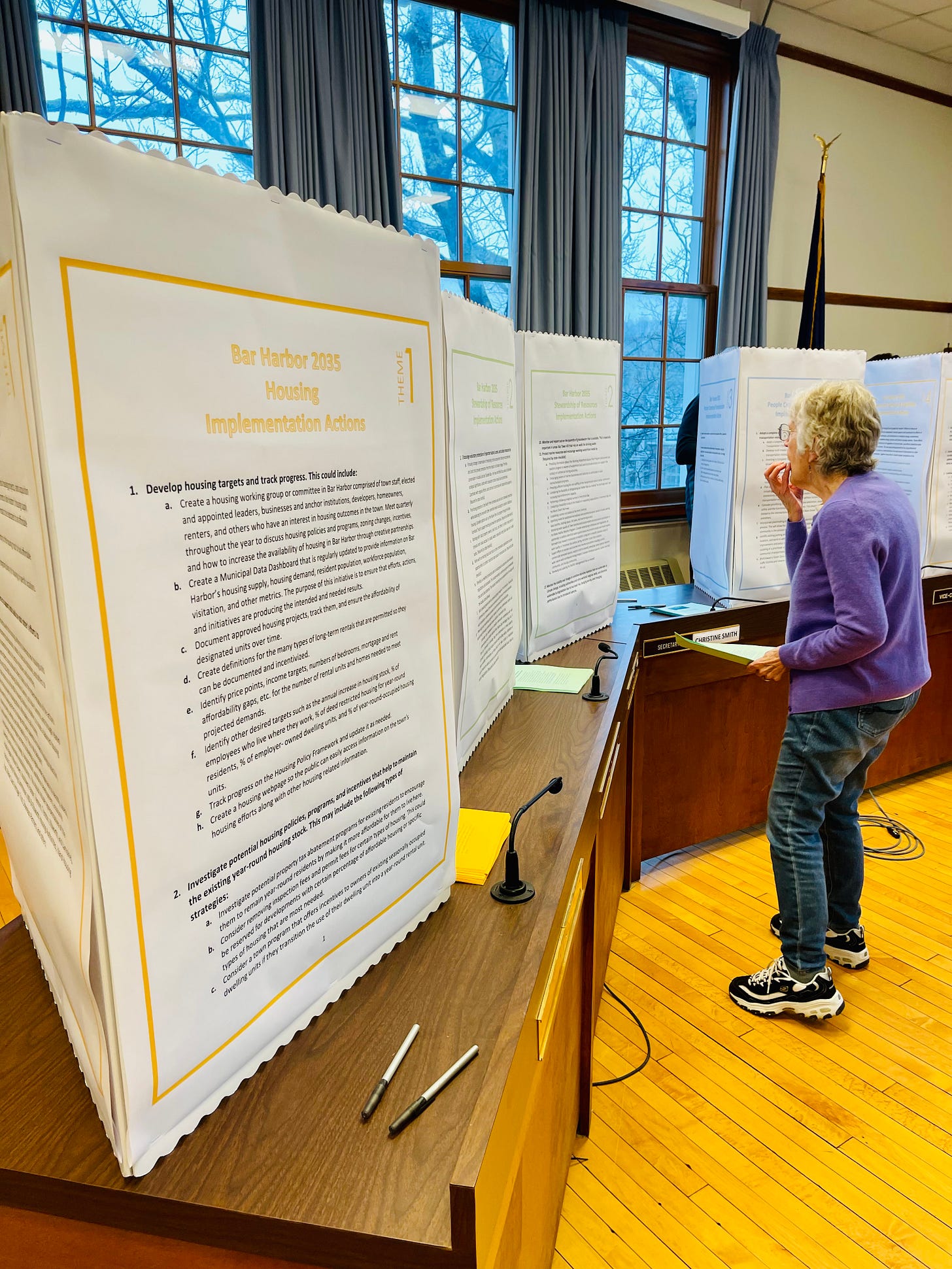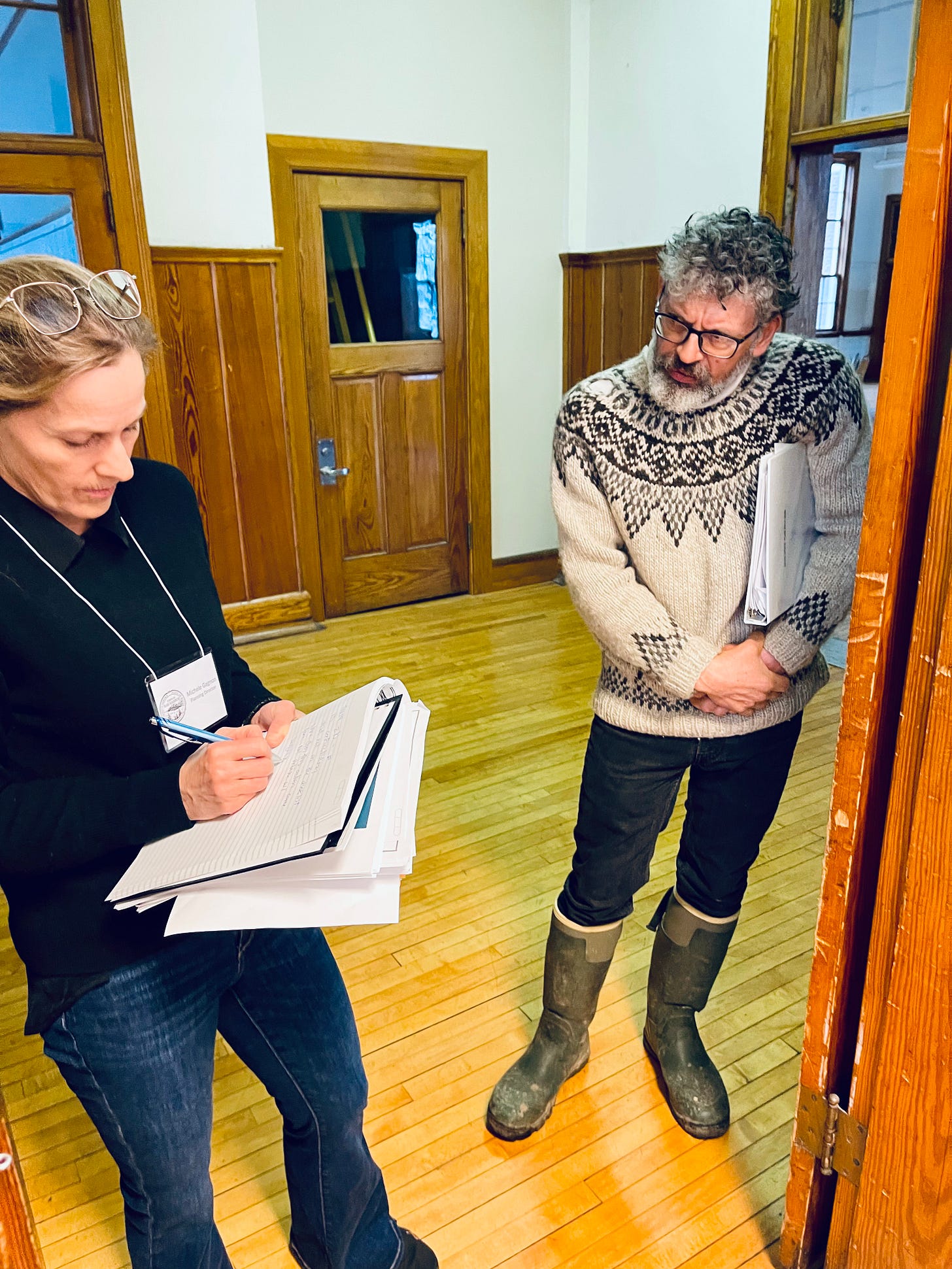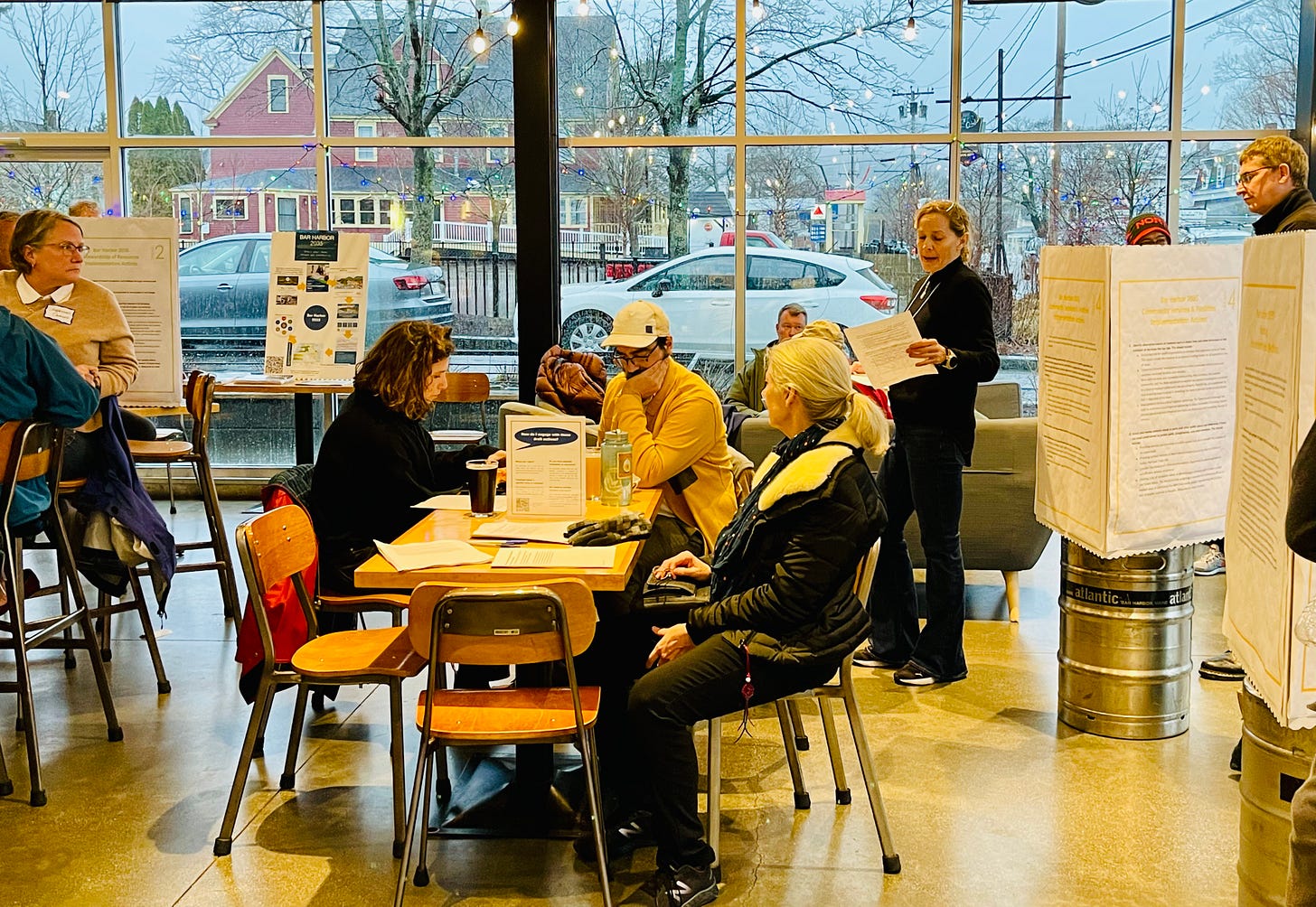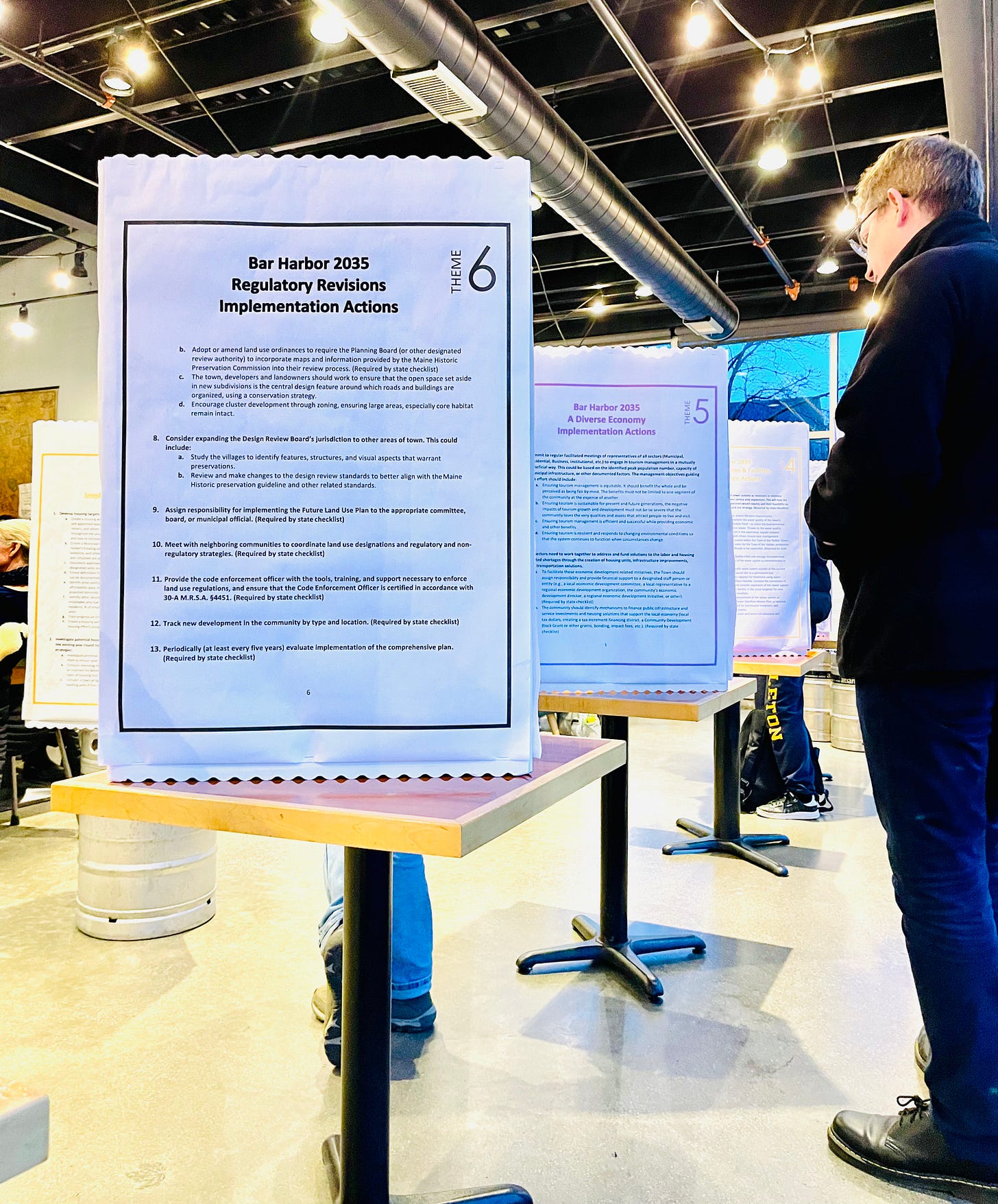Talking Through Bar Harbor's Future
Planning Staff Brings Comprehensive Plan's Themes to The People
BAR HARBOR—Dennis Bracale was worried about making sure each village in Bar Harbor was heard during the process of creating Bar Harbor’s future. The owner of Sweet Peas wondered if there were potential employee housing requirements for smaller employers. Diane Vreeland worried about water in Town Hill and the state’s LD2003. Chris Petersen spoke about solid waste. Dessa Dancy delved into multiple worries and asked for phrases to be defined and along with Lucien Smith questioned some inconsistencies between state law and town rules and environmental factors. Chris Strout worried about small employers like himself being expected to house workers and also about finding those workers and the housing they need.
“It’s all been sucked up,” he said. “The units have disappeared.”
All those worries, all those ideas, all those questions, and all those hopes are part of what the town’s planning staff, consultants, and the Comprehensive Plan Committee have been trying to understand, unpack, and collate as they create a document meant to help guide the town’s future.
It’s a lot.
Just the data and reports, the meeting minutes, the surveys, and the information are stacks of pages and very long files of information as the town tries to translate wants and experiences, data and anecdotes, worries and hopes into something that guides officials and staff. The expected vote on the plan is in 2025.
In three meetings this week, the town held listening sessions that intended to help the town’s Comprehensive Planning Committee involve the public with the plan’s themes. There is also a survey online and paper copies of surveys that people can fill out by April 8 for those who want to be part of the process but couldn’t attend. Each meeting engaged between 30 and 60 people.
At the third workshop at Atlantic Brewery Midtown on Cottage Street, Thursday night, Strout shared his worries. A small business owner, he’s lived in Bar Harbor for 22 years, mostly downtown. He worried that one of the themes might create an expectation that all employers (no matter their size or income) find housing for seasonal employees.
He said that he lived in nine different places in the past two decades in Bar Harbor. All but one are now vacation rentals or owned by bigger employers like hotels, he said.
A workshop earlier that morning at the town’s municipal building and the Zoom session Tuesday night drew similar crowds. All meetings, however, had slightly different concerns, but much of those concerns touched on state regulations, zoning, character of communities, natural resources, tourism, housing need, housing impact, and housing density. And they all discussed how to potentially deal with Bar Harbor’s lack of homes, which is a regional issue as well. On Friday, the Musson Group held the second MDI Housing Solutions Summit at the MDI Biological Laboratory meant to address those issues beyond town borders.
“Not all of us have these deep pockets to do these things,” Strout said, referencing the Witham Family Hotels new shared accommodations project on Kebo Street which broke ground on Thursday and will house over 80 employees.
Bar Harbor, Strout said, has the opposite problem than many other places where people have a place to live, but need a job. Here, he said, people find jobs first and then go on social media, desperate to find a place a live. People respond with laughing-face emojis and tell them, he said, that “you shouldn’t take a job without having a place to live first.”
At the meetings, Bar Harbor Planning Director Michele Gagnon and her staff took comments, answered some questions, and will give all the feedback to the consultants and the committee. The themes presented included housing, the economy (including tourism), sustainable resources, transportation, and infrastructure.
During the Zoom session earlier this week, discussion included deed restricted housing and local control of short-term rentals, and if there were ways to restrict non-residents from buying property for that purpose. Another focus was on Town Hill and its ability to sustain growth amid water concerns.
At the noon session at Bar Harbor’s municipal building, there was a focus on tourism management, LD 2003, a new state law meant to ensure more affordable housing development in municipalities, as well as how the survey questions and massive amount of reading is ungainly.
On Thursday night, Bracale said that in the long term, residents have to answer very hard questions about the future, climate change, population, tourism numbers.
“We have to ask how much is too much?” he said.
WHAT IS A COMPREHENSIVE PLAN?
A comprehensive plan is meant to guide a town’s goals, planning, and aspirations in the next ten years. It usually delves into areas of the town such as land use, zoning, infrastructure, public resources, and economic development. It is meant to provide continuity to a community and also typically meant to help balance competing interests as a community moves toward its goals.
There is meant to be synchronicity between the town’s land use ordinances and the insights and town goals outlined in a comprehensive plan. Basically, it’s meant to guide changes to a town’s land use ordinances in line with the town’s vision.
The project began in December 2021 and is guided by the Comprehensive Plan Committee, overseen by the planning department and a consultant team with monthly meetings, which have gone on for over two years. The project is broken into three phases, Liz Kelly of Resilience Planning Corporation said.
Phase one was analyzing Bar Harbor’s current conditions.
Phase two was about envisioning the future of Bar Harbor, creating a draft vision, and future land use strategy.
Phase three will be about creating the plan.
The plan itself will have an executive summary, comprehensive plan, an implementation matrix, and appendices. Gagnon said it may also potentially have a glossary to help answer questions like the ones that came up during the sessions.
HOW TO ENGAGE
“There is an online survey per action theme (e.g. Housing Solutions, People Centered Transportation, Stewardship of Resources, etc.) that will take individual responses from March 11 through April 8. The printed surveys are available for pick-up and drop-off in the Municipal Building’s lobby and at the Jesup Memorial Library,” according to the town.
People have until April 8 to fill out the surveys. Surveys are available online and at the town offices on Cottage Street as well as the Jesup Memorial Library.
LINKS TO LEARN MORE
State statutes about the comprehensive plan
Bar Harbor’s 2007 Comprehensive Plan
More about the Comprehensive Planning Committee
The town’s website dedicated to the Comprehensive Planning process













